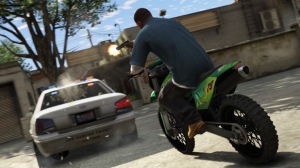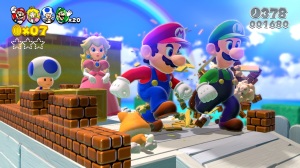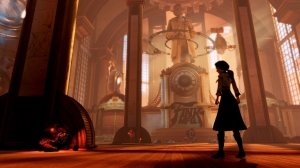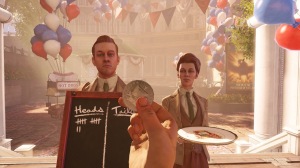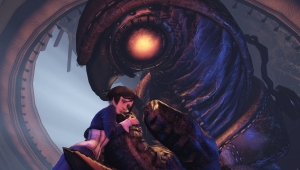2013 certainly took me by surprise. I distinctly remember looking at the slate of coming games and thinking that if this were to be the end of the seventh console generation, it would be slinking off into the grey corner of dusk, with barely a whimper as new consoles would herald a new generation of flashy games and groundbreaking innovations in gameplay. It was a year where the console exclusive was effectively dead, where sequels made up the vast majority of marquee entries of 2012 and even Nintendo seemed to be floundering. I remember thinking to myself, developers must be holding back to release some spectacular titles for the inevitable next generation.
That statement could not have been more inaccurate. 2013 saw several standout games from year’s beginning to end, the rise of importance of the small-team indie development studios and a consumer base that was tired of the status quo, looking to be surprised and entertained by something fresh. Even the new consoles, with their powerhouse graphics and new OS features had a tough time shaking the seventh generation games, which simply refused to go away quietly.
From intellectual reboots to a surprise June blockbuster, to an old favorite in a new suit and a return to Rapture, the games of 2013 encapsulated everything that has brought this industry into the limelight. There was so much good about the year it was difficult choosing some of the best, but I’ll do it anyways.
Editor’s Note: All the games I have decided to consider for Theory Flaw’s Game of the Year must have been played to a reviewable level personally. Unfortunately this means that several stand-out games will be noticeably omitted from consideration, I feel that as one writer, with a very finite revenue stream, this is the only way to award a year accurately (and without bankrupting me).
The Nominees

Animal Crossing: New Leaf – Nintendo – 3DS – June 9, 2013
Why? Personally, Animal Crossing: New Leaf was a system seller. I purchased the game months before I even got the system and just stared at the box. The Animal Crossing franchise always finds interesting ways to improve upon its simplistic mechanics of home building and social interactions. The new interactions via StreetPass and growing your town as mayor constantly provide new goals to go along with the series’ signature progression rewards. Its a game that always finds ways to draw you in.
Why not? Despite Animal Crossing’s addictive nature, many of its systems are childishly archaic. For a game rooted in borderline kleptomania, inventory space is always a problem. A game that has so many rewards deserves to be shown off but more often then not the rewards are shoved through a funnel. Even making things worse, the actual gameplay portions of Animal Crossing remain thin, mini games on the island and social interactions don’t do enough to drown out the mundane tasks of delivery and collection.

Bioshock Infinite – 2K Games – Irrational Games – PC, PlayStation 3, Xbox 360 – March 26, 2013
Why? Bioshock Infinite’s ability to tell a story was taught and precise. The visionary spectacle that was Columbia was a world I had not experienced since exploring the original Bioshock’s Rapture. While Infinite had a number of ideas to explore from its portrayal of racism and the ever present theme of a utopian society, what mattered at the end was a story between a man with a mysterious past and a sheltered girl looking for adventure. It was a wonderful experience from beginning to end, whose story was only surpassed by the grandeur of its setting.
Why not? While experiencing Bioshock Infinite was certainly entertaining, at times the gameplay was far too plodding. Enemies streaming from unknown areas, zones specifically built for combat, a refined combat engine that had seen better days. Bioshock Infinite’s gameplay was not nearly as fun as the story waiting to be told.
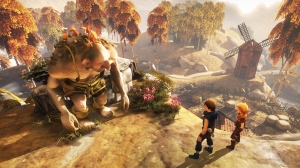
Brothers: A Tale of Two Sons – 505 Games – Starbreeze Studios – PC, PlayStation 3, Xbox 360 – August 7, 2013
Why? Brothers is a heartfelt journey through a gorgeous fairytale that constantly grows around you. If you judge the game solely on the first chapter you are missing out on some of the most spectacular vistas that the two brothers have to traverse. Its simplistic storytelling through a made-up language are enough to draw the player in, to understand the game at an emotional level. The whole game succeeds because of this emotional connection. Even the twin analog controls dictate this connection as neither brother can function without the other. It is a fantastic game that constantly draws you in and leaves you craving more through its strong conclusion.
Why not? Despite the twinsticks being the key component in directing the two brothers, you will often times find yourself struggling to do simple things like walk through the little paths that they need to traverse. A fair amount of ambidexterity is required direct each brother and things get even more awkward when they switch sides on the screen. It’s a good thing that they can’t walk off cliffs because the game would be infinitely more frustrating.
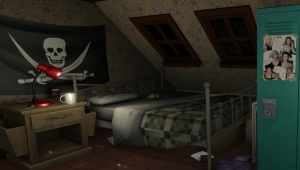
Gone Home – The Fullbright Company – PC – August 15, 2013
Why? Gone Home has a singular story to tell that is poignant and captivating. The simplicity in Gone Home’s storytelling through item discovery is highlighted by just enough story being revealed to keep you exploring the house. The odd thing about Gone Home is that your expectations are heightened because of the atmosphere created by the rainstorm outside, the house’s creaks and lights flickering. It’s a sensation that drives you forward to a conclusion that is well worth the brief time spent at that creepy old house.
Why not? Despite being a first person perspective adventure game, Gone Home is not really a game in the classic sense. Which is fine. While the world is interactive and there are a few puzzles to work out, the only thing preventing you from reaching the end is your attention span. I would categorize Gone Home as an interactive story.
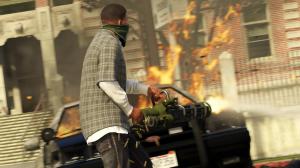
Grand Theft Auto V – Rockstar Games – Rockstar North – PlayStation 3, Xbox 360 – September 17, 2013
Why? If there’s one game that proves that there are still incredible experiences to be had on the outgoing consoles, Grand Theft Auto V makes that statement with a bullet. The team at Rockstar North took such care into creating the world of Los Santos that every minute detail is noticeable. While everybody always points out elements like weather effects and damage models, I distinctly remember the careful attention paid to sound. The engine bays of cars ping quietly when their engine is shut off, conversations occur in the street and as always, the incredible voice cast is top notch. From the trio of protagonists to swap from and the exhilaration felt when executing that first heist, Grand Theft Auto V yanks you into its world, and refuses to let go.
Why not? While the heists were certainly the high point of the game, “filler” missions were often very pedestrian. Sure there are fun side stories and raucous crimes to pull off, but often you spend way too much time driving from point a to point b, listening to conversations like you have for years. It’s ironic that Rockstar created this incredible world to explore, that constantly surprises you and pulls you in, but locks you into a mission structure that is both incredible and blase. Oh, and GTA Online was pretty broken at launch. It works now, but meh.
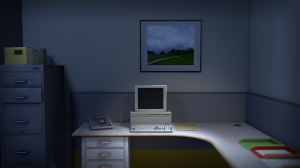
The Stanley Parable – Galactic Cafe – PC – October 17, 2013
Why? It is incredibly clever. With multiple endings dictated by a procedurally generated world, The Stanley Parable exists as a humor piece to discover how many ways this little world can be bent. From the hilarious dialogue of the narrator to the seemingly never ending madness, The Stanley Parable exists as a game to entertain.
Why not? Like Gone Home before it, The Stanley Parable is less of a game than others on this list. Your path is dictated by your direction choice, but you have about as much input as in a Choose Your Own Adventure book.
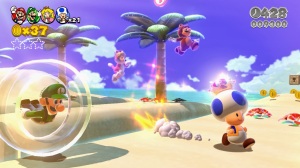
Super Mario 3D World – Nintendo – Wii U – November 22, 2013
Why? Mario’s first true foray into HD is nothing short of spectacular. Crisp visuals are met with tight platforming controls and gameplay challenges that are just a ton of fun. Each world builds on its own original set pieces and fighting the Bowser and his Koopa kids is always a blast. The same screen multiplayer retains the same four-player insanity found in the New Super Mario Bros. series, only refined to accommodate for the gorgeous 3D levels. All in all a terrific platformer that also has some of the best power-ups ever in a Mario game.
Why not? Some may argue that 3D world was a step forward for the franchise, but not the genre-busting revolution like Super Mario Galaxy was. The game is never overtly challenging until the later worlds and even the multiplayer can result in a fair amount of frustration thanks to sketchy camera work.
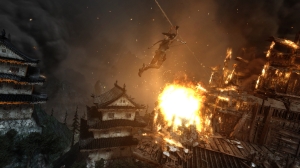
Tomb Raider – Square Enix – Crystal Dynamics – PC, PlayStation 3, Xbox 360 – March 5, 2013
Why? Tomb Raider was captivating in that it told a new story for a character that was already so ingrained into my memory. The re-emergence of Lara Croft as a story driver could not have been better. I adored the new direction that Crystal Dynamics chose in framing Lara as an intelligent but unknown commodity, a character who really blossoms in this new origin chapter that they are exploring. It does not hurt at all that the game is gorgeous across seventh generation consoles and PC and has possibly the best execution of bow and arrow mechanics in all of gaming.
Why not? Despite its billing as Tomb Raider, the discovery of treasure and puzzle solving takes a back seat as an optional element of the game. And while Tomb Raider does a great job at capturing a cinematic feel to it, one has to wonder how successful this game would have been if Uncharted had not been so stellar previously (which ironically was inspired by the original Tomb Raider games).
